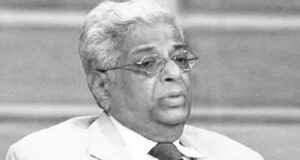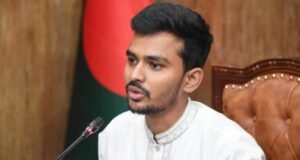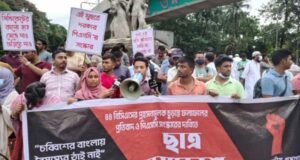
UK Minister for the Indo-Pacific Catherine West holds a meeting with Chief Adviser Prof Muhammad Yunus at the State Guest House Jamuna in Dhaka on 17 November. Photo: PID
The British government will extend full support to the interim government of Bangladesh, including its efforts to bring back billions of dollars of laundered money, said UK Minister for the Indo-Pacific Catherine West today (17 November).
She made the assurance when she called on Chief Adviser (CA) Prof Muhammad Yunus at the State Guest House Jamuna in Dhaka, according to the CA’s Press Wing.
“It is important to let you know that you’ve got our support,” West told Yunus, who took over as the head of the government three days after a mass upsurge ousted the Awami League government on 5 August.
Yunus thanked her, saying that returning money laundered by corrupt politicians, oligarchs, and bureaucrats is a top priority of the interim government.
He quoted a recent Transparency International Bangladesh report, saying annually more than $12 billion were siphoned off abroad.
During the meeting, Yunus described his government’s reform initiatives to fix the country’s key institutions and the election commission.
The chief adviser said the reforms are aimed at ensuring free and fair elections in the country and to break away from the rampant vote rigging practised by the previous regime.
West backed the reforms, saying Britain would like to see vibrant debates on the key aspects of electoral, judiciary, and constitutional reforms.
The minister announced £10.3 million of UK grant support to provide essential services and assistance to the Rohingya refugees, the host communities and those affected by natural disasters in Bangladesh.
Yunus reiterated his call for a “UN-overseen safe zone” for communities in Myanmar’s violence-plagued Rakhine so that they don’t have to flee across the border to Bangladesh and charities and aid groups can take food and assistance at the doorsteps of the displaced people.
During the meeting, they also discussed geopolitical issues, minority rights, ties with South Asian neighbours, and Bangladesh’s recent 40 megawatt energy deal with Nepal.
Yunus said his government has fully backed the creation of a South Asian electricity grid to bring power from hydroelectricity-rich Nepal and Bhutan.
He said Bangladesh can ease off its reliance on fossil fuels if it can import renewable energy from the two Himalayan countries. He added that Bangladesh needs collaboration with India to this effect.
During the meeting, Sarah Cook, the British high commissioner to Dhaka, said a UK medical team arrived in the country this month to treat students and other demonstrators who were critically injured during the July-August mass uprising.
“They are conducting three surgeries a day,” she said.
 Weekly Bangla Mirror | Bangla Mirror, Bangladeshi news in UK, bangla mirror news
Weekly Bangla Mirror | Bangla Mirror, Bangladeshi news in UK, bangla mirror news







